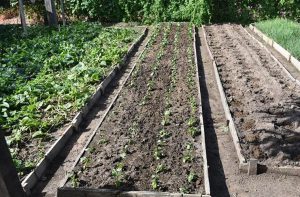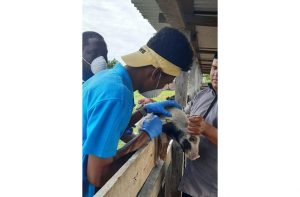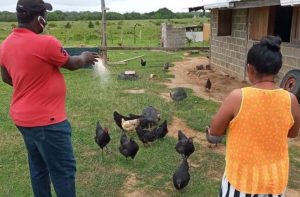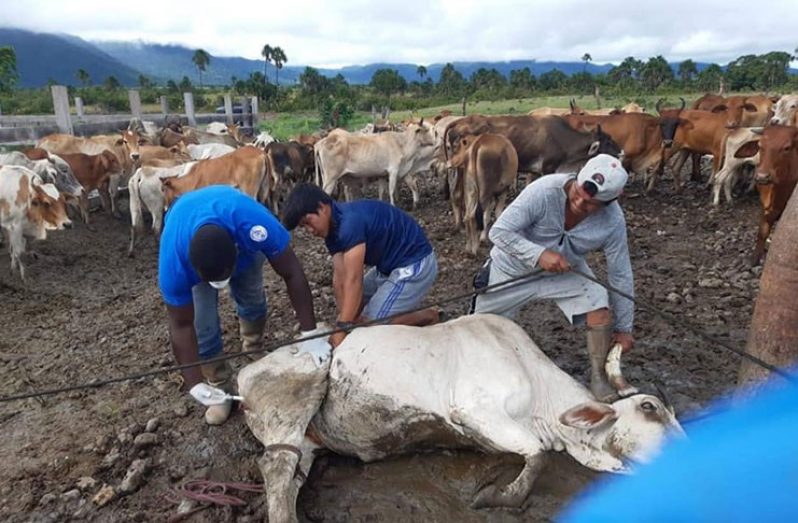By Lisa Hamilton
THOUGH Region Nine has its geographical challenges, workers of the Guyana Livestock Development Authority (GLDA) and the National Agricultural Research and Extension Institute (NAREI) are withstanding even the odds of COVID-19 to bring crop and livestock support to Guyanese.

In an interview with the Guyana Chronicle, Agriculture Programme Coordinator of Region Nine and Regional Coordinator of the GLDA, Dr. Darren Halley, detailed the challenges faced by the two agencies as well as their efforts to ensure the productivity.
WITHSTANDING CHALLENGES
He said that, under the constraints of COVID-19, workers of the GLDA and NAREI have had to adhere to reduced contact with villagers. They are working based on rotation and observe physical distancing while at work, whether internally or out on visitation.
Due to the construction of gates at many indigenous villages, for the monitoring of entry, visits by the agencies must be scheduled a week in advance while emergency cases are catered for, as they arise, with the help of Village Toshaos.
However, agriculture workers must also grapple with a number of transportation challenges, regularly, when it comes to providing services to the Region. They include challenges in reaching far-flung villages due to bad weather and poor road conditions. On many occasions, workers also have to prepare themselves to travel the long distance to farms even after arriving at the residence of the villager in need.
Dr. Halley noted that workers need to be agile on their feet in order to restrain wild livestock for inspection or medication. Through the government, the GLDA is the only agency providing these services to the Region, but groups working privately, such as the Rupununi Livestock Producers Association (RLPA), sometimes assist.
DISEASE, PESTS AND PARASITES
When it comes to assisting livestock farmers with disease or parasite control, Dr. Halley said that the GLDA relies on a vaccination schedule. The animals are inspected and vaccinated for rabies, blackleg and botulism. The latter two are common in the rainy season and can lead to high mortality rates.

Livestock are also inspected and treated for internal and external parasites. The animals are vaccinated for common parasites like worms and the necessary vitamins are simultaneously administered to reduce the number of times agriculture workers must travel to the remote areas.
On a weekly basis, workers of the GLDA visit about 45 farmers in villages stretched across the five sub-districts of Deep South Rupununi, South Central Rupununi, Central Rupununi, North Rupununi and South Pakaraimas.
Meanwhile, the GLDA, upon the request of farmers, also conducts castrations and minor surgeries in cases of dystocia — challenges related to an abnormal or difficult birth.
THE BLACK GIANT CHICKEN
One opportunity that farmers in the Region are actively making use of is the Black Giant Chicken. It is a large dual-purpose bird, which has the ability to produce up to 200 eggs annually and about 4.5 kilograms of meat.
These birds have the ability to graze, forage and eat leftovers from the kitchen while still producing reasonably well. Given these qualities, the government decided, back in 2017, that the bird is well-suited to hinterland regions.

It was in that year that the GLDA launched the Hinterland Development Black Giant Poultry Programme, commencing with the handing over of 100 Black Giant chickens along with the requisite start-up feed and other supplies to Mahdia Secondary School in Region 8.
Dr. Halley reported that, in Region 9, the programme is performing exceptionally as many farmers are interested in purchasing the birds and are benefitting. They are present in all five sub-districts of the Region.
When representatives of the GLDA visit residents who own the birds, they check for progress such as weight gain, the number of eggs laid, the hatchability of eggs laid and the type of feed being used.
ACTIVE KITCHEN GARDENING
In the area of crop management, it was noted that, on a weekly basis, approximately 100 visits are conducted by workers of NAREI. There are presently 7 extension staff in the Region and one each is assigned to Central Rupununi, Karasabai Sub District, Aishalton Sub District, Annai Sub District, Sand Creek Sub District and Shulinab.
What workers of NAREI have noticed is that farmers throughout the Region are being affected by a wide variety of insect pest and diseases and are finding it difficult to control these because of the unavailability of different insecticides.
The most common insecticide available to farmers is Fastac, but, with constant use, some insects are becoming resistant to the chemical. As such, farmers have been advised to try home remedies to control aphids which are commonly found in kitchen gardens.
Farmers have also been advised to keep their gardens free from weed and to properly dispose of infected plant parts.
Dr. Halley said that a number of residents in the Region are also growing their own kitchen gardens and have participated in the Agriculture Ministry’s Kitchen Garden competition.
With the emergency of COVID-19, farmers have the ability to spend more time grooming their kitchen garden from home. They are also spending time processing cassava roots into farine and making other edible byproducts.
Much emphasis is being placed on new farming techniques and farmers are being encouraged by NAREI to transform their method of farming from a subsistence level to a commercial level.




.jpg)










